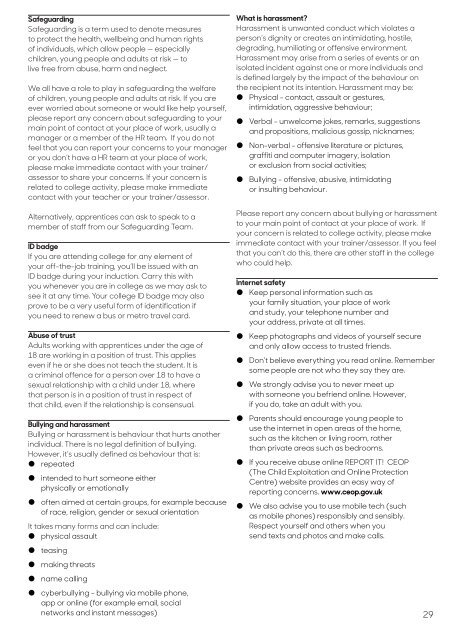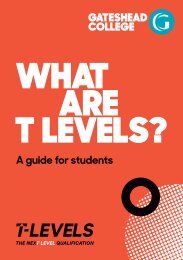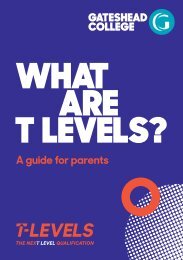Apprenticeship Handbook 2023/24
You also want an ePaper? Increase the reach of your titles
YUMPU automatically turns print PDFs into web optimized ePapers that Google loves.
Safeguarding<br />
Safeguarding is a term used to denote measures<br />
to protect the health, wellbeing and human rights<br />
of individuals, which allow people — especially<br />
children, young people and adults at risk — to<br />
live free from abuse, harm and neglect.<br />
We all have a role to play in safeguarding the welfare<br />
of children, young people and adults at risk. If you are<br />
ever worried about someone or would like help yourself,<br />
please report any concern about safeguarding to your<br />
main point of contact at your place of work, usually a<br />
manager or a member of the HR team. If you do not<br />
feel that you can report your concerns to your manager<br />
or you don’t have a HR team at your place of work,<br />
please make immediate contact with your trainer/<br />
assessor to share your concerns. If your concern is<br />
related to college activity, please make immediate<br />
contact with your teacher or your trainer/assessor.<br />
Alternatively, apprentices can ask to speak to a<br />
member of staff from our Safeguarding Team.<br />
ID badge<br />
If you are attending college for any element of<br />
your off-the-job training, you’ll be issued with an<br />
ID badge during your induction. Carry this with<br />
you whenever you are in college as we may ask to<br />
see it at any time. Your college ID badge may also<br />
prove to be a very useful form of identification if<br />
you need to renew a bus or metro travel card.<br />
Abuse of trust<br />
Adults working with apprentices under the age of<br />
18 are working in a position of trust. This applies<br />
even if he or she does not teach the student. It is<br />
a criminal offence for a person over 18 to have a<br />
sexual relationship with a child under 18, where<br />
that person is in a position of trust in respect of<br />
that child, even if the relationship is consensual.<br />
Bullying and harassment<br />
Bullying or harassment is behaviour that hurts another<br />
individual. There is no legal definition of bullying.<br />
However, it’s usually defined as behaviour that is:<br />
● repeated<br />
●<br />
●<br />
intended to hurt someone either<br />
physically or emotionally<br />
often aimed at certain groups, for example because<br />
of race, religion, gender or sexual orientation<br />
It takes many forms and can include:<br />
● physical assault<br />
●<br />
●<br />
●<br />
●<br />
teasing<br />
making threats<br />
name calling<br />
cyberbullying - bullying via mobile phone,<br />
app or online (for example email, social<br />
networks and instant messages)<br />
What is harassment?<br />
Harassment is unwanted conduct which violates a<br />
person’s dignity or creates an intimidating, hostile,<br />
degrading, humiliating or offensive environment.<br />
Harassment may arise from a series of events or an<br />
isolated incident against one or more individuals and<br />
is defined largely by the impact of the behaviour on<br />
the recipient not its intention. Harassment may be:<br />
● Physical - contact, assault or gestures,<br />
intimidation, aggressive behaviour;<br />
●<br />
●<br />
●<br />
Verbal - unwelcome jokes, remarks, suggestions<br />
and propositions, malicious gossip, nicknames;<br />
Non-verbal - offensive literature or pictures,<br />
graffiti and computer imagery, isolation<br />
or exclusion from social activities;<br />
Bullying - offensive, abusive, intimidating<br />
or insulting behaviour.<br />
Please report any concern about bullying or harassment<br />
to your main point of contact at your place of work. If<br />
your concern is related to college activity, please make<br />
immediate contact with your trainer/assessor. If you feel<br />
that you can’t do this, there are other staff in the college<br />
who could help.<br />
Internet safety<br />
● Keep personal information such as<br />
your family situation, your place of work<br />
and study, your telephone number and<br />
your address, private at all times.<br />
●<br />
●<br />
●<br />
●<br />
●<br />
●<br />
Keep photographs and videos of yourself secure<br />
and only allow access to trusted friends.<br />
Don’t believe everything you read online. Remember<br />
some people are not who they say they are.<br />
We strongly advise you to never meet up<br />
with someone you befriend online. However,<br />
if you do, take an adult with you.<br />
Parents should encourage young people to<br />
use the internet in open areas of the home,<br />
such as the kitchen or living room, rather<br />
than private areas such as bedrooms.<br />
If you receive abuse online REPORT IT! CEOP<br />
(The Child Exploitation and Online Protection<br />
Centre) website provides an easy way of<br />
reporting concerns. www.ceop.gov.uk<br />
We also advise you to use mobile tech (such<br />
as mobile phones) responsibly and sensibly.<br />
Respect yourself and others when you<br />
send texts and photos and make calls.<br />
29

















